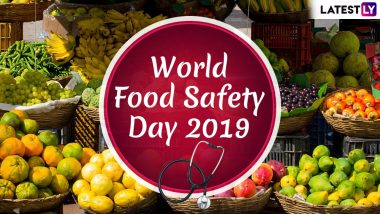June 7, 2019, is the world’s first ever Food Safety Day. The day is observed by the United Nations to underline the need for promoting clean and safe food. From farms to the dinner table, food safety should be followed at every step. According to the UN, an estimated 600 million cases of food-borne illnesses are reported every year. Unsafe food is hazardous to health and economies. Keeping this in mind, the theme for the inaugural World Food Safety Day 2019 is ‘Food Safety, Everyone’s Business.’ The day gives us an opportunity to talk about the significance of food safety and the consequences of failing to adhere to clean food standards. On the occasion of World Food Safety Day, here are 5 basic rules of following food safety.
1. Keep Clean
Most microorganisms are not disease causing in nature. But some of them can seriously harm your health. They can cling on to your hands, wiping clothes, utensils and cutting board if you are not careful. They may get transferred to foods and cause a long list of diseases -- from E.coli infections to salmonella poisoning.
- So keep your hands clean before, during and after food handling.
- Wash your hands every time you visit the toilet.
- Protect kitchenware from ants, bugs, cockroaches and other pests that creep into the kitchen.
2. Separate Raw and Cooked Food
Cross-contamination from raw to cooked food is one of the biggest causes of food-related diseases. Raw food, especially meat, dairy and seafood, can transfer microorganisms to other food if they are stored with cooked food.
- So separate raw food from cooked in your kitchen, pantry and refrigerator.
- Use separate utensils to store cooked and raw food.
- Use separate knives to cut raw and cooked food.
- Use separate containers to store raw and cooked food.
3. Cook Thoroughly
Cooking foods at 70 degrees or higher can kill all the harmful germs that may thrive at a lower temperature. Large pieces of meat such as whole poultry (chicken and turkey), steaks, etc. usually do not cook thoroughly, leaving uncooked parts that can harbour microorganisms.
- So cook food such as meat, poultry, seafood and eggs over 70 degree Celsius.
- Reheat cooked food thoroughly.
- Ensure that meat products do not leak a pink fluid, which indicates that it is raw.
4. Keep Food at Safe Temperature
Microorganisms thrive better in room temperature. And if the temperature is right, they can multiply quickly. But if the food is stored below 5 degree Celsius and above 60 degree Celsius, the growth of the microorganisms is arrested.
- Do not leave food at room temperature for more than two hours.
- Refrigerate all cooked food below 5 degree Celsius.
- Heat the food to 60 degree Celsius before serving.
- Do not thaw frozen food at room temperature.
5. Use Safe Water and Clean Raw Materials
Sometimes, it’s not only the food but also the materials used to prepare food that can cause food poisoning. The importance of using clean water to cook cannot be overstated. Even the raw ingredients may contain toxic moulds, worms and other disease-causing agents.
- Use only clean, potable water to cook.
- Buy foods that are clean, fresh and wholesome.
- Wash foods thoroughly before eating them raw.
- Do not consume foods whose expiry date has passed.
Everyone has the right to clean, safe food. According to the United Nations, almost one in 10 is taken ill after eating contaminated food. It’s our basic need to have access to safe food, without which health, communities, economies and lives suffer.
(The above story first appeared on LatestLY on Jun 07, 2019 03:39 PM IST. For more news and updates on politics, world, sports, entertainment and lifestyle, log on to our website latestly.com).













 Quickly
Quickly


